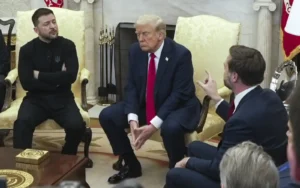On September 23rd, Ukraine’s parliament passed a law into effect to order “oligarchs” to register and to stay out of politics. The law will come into effect on May 7th of next year. The law, signed by all members of parliament and President Zelensky, was published in the parliamentary newspaper Holos Ukrainy on November 6th. According to the text of the law, it will therefore come into force the day after publication, and will be put into execution six months after the date of entry into force, in other words: May 7th.
The law gives a definition for an oligarch, and further gives a body headed by the president, the National Security and Defense Council, the power to determine who meets the criteria. According to the law, oligarchs are forbidden from financing political parties or taking part in privatisations, and top senior officials, including the president, are required to declare any dealings they have with oligarchs.
“Necessary to protect the country”?
President Zelensky has said that the anti-oligarch law is necessary to protect the country from powerful businessmen who have corrupted its political system for decades. “Thanks to the anti-oligarch law, Ukraine gets a historic chance to build a civilized and clean relationship between big business and the state,” Zelensky said in a statement in September. Other politicians, both those in the president’s party and those in the opposition, have also praised the law, though some do consider it only a small step in the right direction.
Though there are a number of politicians and parties in favour of the law, enough to pass the law into effect, the law also has its critics. Critics declare that the criteria for determining who qualifies as an oligarch are too subjective, and that they can therefore be open for manipulation. A person is defined as an oligarch if they meet at least three of four different criteria. Two such criteria are that the oligarch must participate in political life or have a significant impact on the media. Critics fear these criteria are too loosely formulated, leaving too much room for debate and manipulation. Furthermore, opponents are against the National Security and Defense Council headed by the president that determines who is an oligarch in contested cases. Critics say they fear that the law will be applied selectively to concentrate power in the president’s hands.
Zelensky’s own dealings with oligarchs
President Zelensky’s personal history gives this anti-oligarch law an interesting twist. Zelensky himself has strong business ties to oligarch Ihor Kolomoisky, owner of 1+1, one of Ukraine’s most popular TV channels. Zelensky was an actor and comedian before running for president, and during the campaign for the 2019 presidential elections, which Zelensky won with 73%, 1+1 broadcasted his shows and gave him a powerful platform. Since taking office, Zelensky stands accused of maintaining links with Kolomoisky, shaping the policies and personnel choices of his government in line with Kolomoisky’s interests, while reaping positive media coverage in return.
The question remains whether the new anti-oligarch law will affect these relationships, or whether President Zelensky will only use the law to weaken opposition politicians, putting into effect exactly that which critics fear.
Sources: Ukranews, Reuters, Euromaidan, AtlanticCouncil
Photo: Flickr



